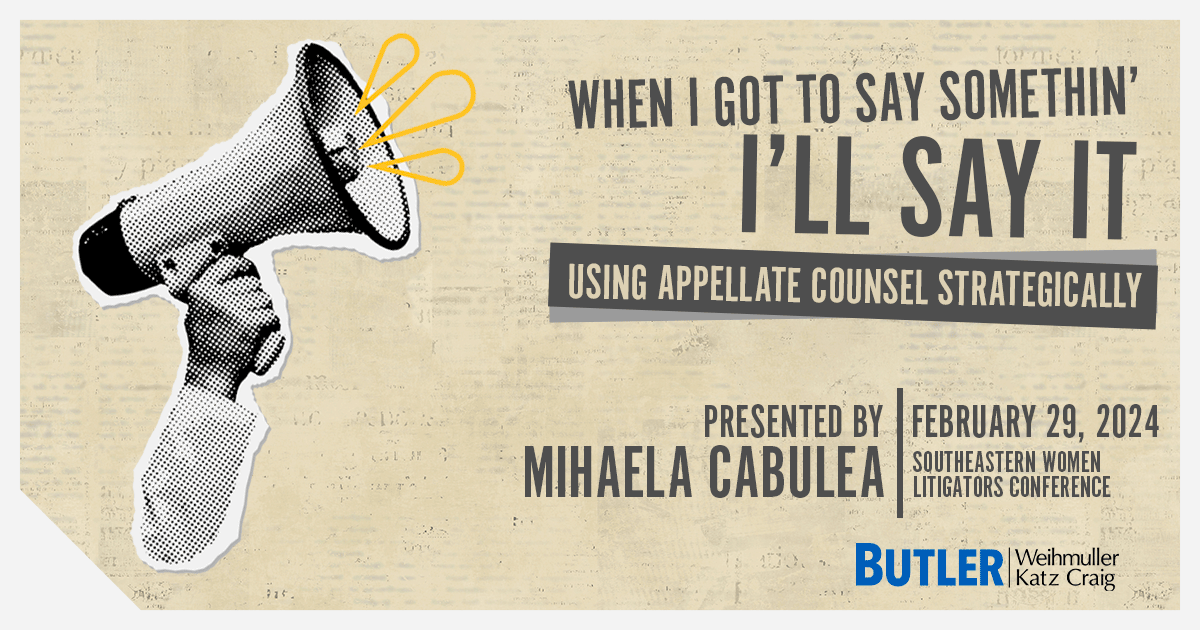
When I Got to Say Somethin’, I’ll Say It: Using Appellate Counsel Strategically
By Mihaela Cabulea | Events
February 27, 2024
Partner | Appellate, First-Party Coverage, Extra-Contractual, Third-Party Coverage
813-281-1900
mcabulea@butler.legal
Overview | Blog Posts | Appellate | Mihaela Cabulea | Related | Print | Share
Motions for rehearing filed pursuant to Florida Rule of Civil Procedure 1.530 applied only to final judgments and orders that would complete the judicial labor on a portion of the case. Motions for reconsideration applied to nonfinal, interlocutory orders and were premised on a trial court’s inherent authority to reconsider and, if appropriate, alter or retract any of its nonfinal rulings prior to entry of the final judgment or of an order terminating the action. Authorized and timely motions for rehearing toll the time for filing the notice of appeal, whereas motions for reconsideration of non-final orders do not.
In August 2022, the Florida Supreme Court sua sponte amended rule 1.530 to require a party who wanted to preserve for appeal a challenge to the sufficiency of a trial court’s findings in the final judgment to raise that issue in a motion for rehearing under subsection (a) of the rule. In re Amendments to Florida Rule of Civil Procedure 1.530, 346 So. 3d 1161, 1162 (Fla. 2022). The rule became effective immediately, but because that amendment was not published for comment prior to its adoption, the Florida Supreme Court offered interested parties the opportunity to submit comments on the amendments.
As a result of the comments received, the court again amended rule 1.530 on April 27, 2023, to make the requirement in subsection (a) applicable to both final and non-final orders. See In re Amendments to Florida Rule of Civil Procedure 1.530, No. SC2022-0756 (Fla. Apr. 27, 2022) (explaining that the change is “applicable to all orders, not just final judgments, and makes clear that [the rule applies] only when a judge is required to make specific findings of fact and not when a party seeks to make other challenges to a trial court’s order”). The amended rule is effective immediately and reads as follows:
(a) Jury and Non–Jury Actions. A new trial may be granted to all or any of the parties and on all or a part of the issues. To preserve for appeal a challenge to the failure of the trial court to make required findings of fact, a party must raise that issue in a motion for rehearing under this rule. On a motion for a rehearing of matters heard without a jury, including summary judgments, the court may open the judgment if one has been entered, take additional testimony, and enter a new judgment.
Fla. R. Civ. P. 1.530(a) (emphasis added).
The amendment blurs the distinction between rehearing and reconsideration and expands rehearing to a certain class of non-final orders, i.e., those in which the trial court is required to make specific findings of fact. Such orders may be immediately appealable under Florida Rule of Appellate Procedure 9.130 (for example, an order determining personal jurisdiction, which is immediately appealable under rule 9.130(3)(C)(i)). However, subsection (b) of rule 1.530, governing the time for filing a motion for rehearing does not appear to account for such a situation, because it still requires a motion for rehearing to be filed no later than 15 days after the return of the verdict in a jury trial or the date of the filing of the judgment in a non-jury action. If the purpose of the rule is to cure deficiencies in the trial court’s orders that could easily avoid a reversal for grounds unrelated to the merits of the case, then surely, a motion for rehearing of an immediately-appealable non-final order for failure of the trial court to make required findings of fact would better serve the purpose of the rule if filed prior to undertaking an interlocutory appeal. The question is whether such a motion should have a tolling effect given the expedited nature of interlocutory appeals, or whether the tolling effect should be reserved for rehearing of final judgments.
The 15-day deadline from the verdict (in jury trial cases) or final judgment (in non-jury actions) for filing a motion for rehearing of non-final orders that are not immediately appealable makes sense in light of the well-settled rule that a trial court has inherent authority to reconsider and, if appropriate, alter or retract any of its nonfinal rulings at any time prior to entry of the final judgment.
Meanwhile, a conservative approach when it comes to immediately-appealable non-final orders in which the trial court fails to make required findings of fact would be best for avoiding any waiver: file a motion for rehearing prior to filing an interlocutory appeal, and assume the motion is not tolling for purposes of filing the notice of appeal. The worst that could happen under this scenario is that your appeal would be held in abeyance (if the motion would be deemed to have a tolling effect) until your motion for rehearing is resolved by the trial court. See Fla. R. App. P. 9.020(h)(2)(C). But if you do not file the motion for rehearing prior to the interlocutory appeal, your appeal will not result in a decision on the merits but in a reversal on procedural grounds. And if you were to treat a motion for rehearing of an immediately-appealable non-final order as tolling, when in fact the court might not have intended it to have a tolling effect, then you jeopardize your client’s right to appeal.
For any further questions, please contact Mihaela Cabulea May.

By Mihaela Cabulea | Events
February 27, 2024


By Carol Rooney | News
November 7, 2023

By Mihaela Cabulea | Events, Webinars
September 18, 2023

By Matthew Lavisky | Events
August 16, 2023